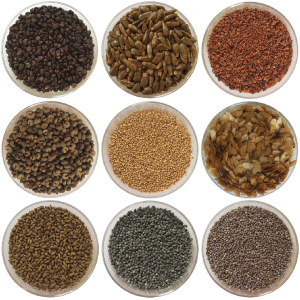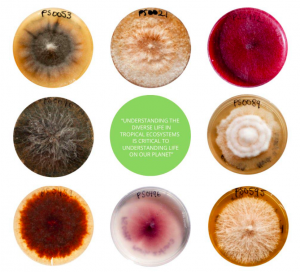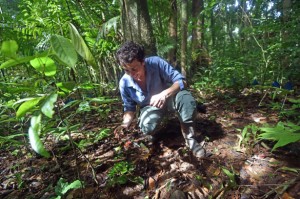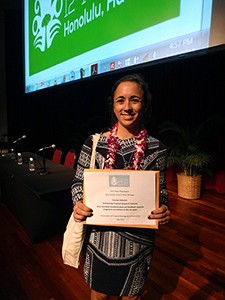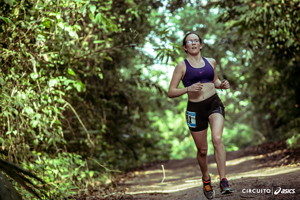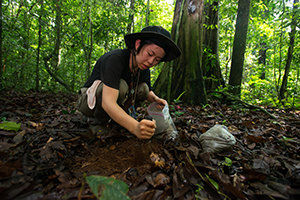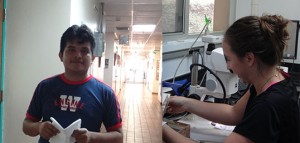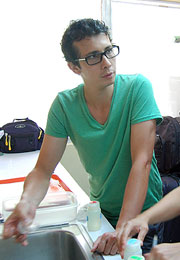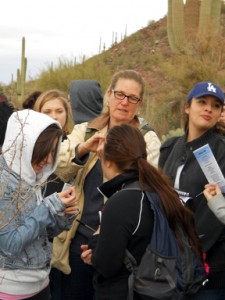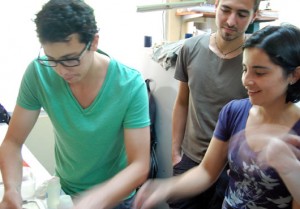Our most recent paper featured in the Smithsonian Tropical Research Institute News (Oct 2017)
Our most recent publication – Soilborne fungi have host affinity and host-specific effects on seed germination and survival in a lowland tropical forest – published in the Proceedings of the National Academy of Sciences was featured in the last edition of the STRI News.
The publication was also featured in Europapress (in Spanish).
Our project in the Smithsonian Institution 2016 Annual Report (May 2017)
“Scientists increasingly recognize that individual organisms—birds, insects, plants, humans—are actually a blend of host and symbiotic microorganisms. For example, scores of different species of fungi and bacteria live within a postage-stamp-sized area of a leaf. By demonstrating the effects of these microbes, we can learn how these communities benefit or harm their host plants, and affect the function of entire forest communities in important ways we are only beginning to understand” says Allen Herre in the Smithsonian 2016 – Annual Report.
The project in the news (December 2015)
Last week, we had a visit from two journalists from AFP, who made the project visible, both, in the local news and internationally. Here are some links:
Carolyn won the 2015 New Phytologist Best Poster Prize in Plant Biology in the Annual Meeting of the ATBC in Honolulu, Hawaii.
Carolyn Delevich had the opportunity to travel to Hawaii in July 2015 to attend the 2015 annual meeting of the Association for Tropical Biology and Conservation. She presented the work she conducted as a side project while she was on BCI: “Does microbial-mediated plant-soil feedback regulates congeneric recruitment in the genus Cecropia“, Congratulations Carolyn!
Welcome, Liz! (May 2015)
In May 1st, Elizabeth Ryan landed in Panama for an exciting period of 6 months working as Field and Lab assistant in our project. Liz has a double major in Biology and Architecture from Brown University and will be based on BCI. We are sure Liz is a great addition to our team in Panama and we wish her a nice and productive time in Panama.
Fourth Annual Project Meeting (April 2015)

Left: Instron device. Middle: Camilo and Adam sharing thoughts in the seed lab. Right: Jim, Carolina, and Adam, in the woods nearby Urbana-Champaign, IL.
The fourth annual meeting was held in Urbana-Champaign, IL from April 1st. to April 5th. Members of our team working in Panama had the opportunity to visit the Seed Lab in the University of Illinois, interact with members of the Dalling Lab, and use the Instron system (i.e., device used to measure the seed fracture resistance), among others. We all had a great time sharing results, analysing data and establishing future goals in our project.
Venus appears in the Smithsonian Tropical Research Institute Newsletter (June 2014)
Venus Kuo is an IB Honors student and recipient of an NSF Research Experience for Undergraduates Grant. She is spending the summer on Barro Colorado Island, Panama.
Photo and story credit: Sean Mattson (this originally appeared in the newsletter of the Smithsonian Tropical Research Institute: here).
The hot and humid tropical forest floor voraciously decomposes virtually anything that is biodegradable. So it came as a bit of a surprise when Jim Dalling, a professor at the University of Illinois, demonstrated that seeds from some pioneer tree species can retain their ability to germinate for up to four decades in forest topsoil. His research, published in The American Naturalist in 2009, inspired Venus Kuo, an undergrad at UI, to find out what keeps seeds viable. She suspects soil fungi. “Do they play some kind of a protective, mutually beneficial role for the seeds?” asked Kuo, as she hiked to the 50-hectare forest plot on Panama’s Barro Colorado Island where the seeds for the original study were collected. Pioneer trees are the first to emerge when a forest regenerates. But they need a lot of light and this is in low supply in the understory. Not until a tree falls and opens a gap will pioneers have a chance to grow into reproductive adults. Kuo will collect seeds from Dalling’s sites as well as other spots in the 50-hectare plot where tree census data suggest pioneer species rained seeds on the forest floor decades ago. She will test the seeds for viability and diversity of endophytic fungi, and compare her findings with younger seeds. She expects fungal diversity will be lower in older seeds, pointing to which fungi may promote long-term seed dormancy. “I think it can probably lead to some interesting questions about how we can predict tree emergence and canopy composition over time,” said Kuo.
Meeting in Panama (December 2013)
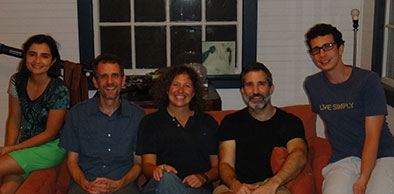
Meeting in Gamboa. From left to right: Carolina Sarmiento, Jim Dalling, Betsy Arnold, Adam Davis, and Camilo Zalamea.
Our group met from December 14th to 16th, in Gamboa, Panama. We examined the main results that will be included in two manuscripts, currently in preparation, and planned future work.
Welcome, Ariel and Carolyn! (December 2013)
Ariel Pérez, panamanian young biologist and Carolyn Delevich, recently graduated form Ohio State University, have joined our team in Panama. We are excited to have them on board and hope they can have a very enriching experience as residents in Barro Colorado Island.
Second Annual Meeting in Arizona (February 2013)
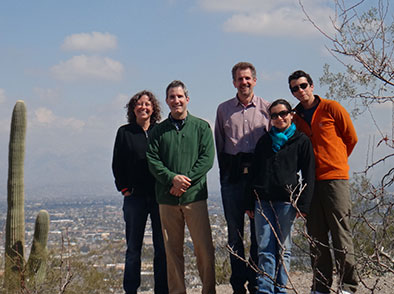
Our happy team at the top of Tumamoc Hill with Tucson in the background. From left to right: Betsy Arnold, Adam Davis, Jim Dalling, Carolina Sarmiento, and Camilo Zalamea.
The second annual meeting of our project was held from February 21st to 23rd at the University of Arizona, hosted by Betsy Arnold. We spent a great time in Tucson, sharing the project’s progress, discussing the challenges from past work and finding the best strategies for the future work.
First seeds are in the ground! (March 2012)
A is for ‘Apeiba’ — our first focal species! Thanks to collections made and processed by Camilo, Carolina, Ignacio, and Kayla, our first seeds are in bags and have been planted out at experimental plots across the island. The team has measured many environmental characteristics of each plot as part of the burial process. First excavation data are coming soon…and Ochroma is up next!
Welcome, Margaret Wilch! (February 2012)
We are delighted to welcome Margaret Wilch, an outstanding teacher from Tucson High Magnet School, to our research and outreach team. Margaret brings a strong background in microbial symbioses and will be in integral part of our work for the coming year. We gratefully acknowledge the National Science Foundation’s RET supplement program for supporting her work, which will include field research in Panama and co-leadership of a workshop in plant-fungal associations at Tucson High. Welcome Margaret!
First PI meeting and field project planning session (February 2012)
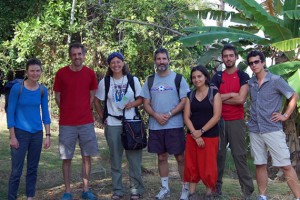
Our team at Barro Colorado Island, Panama, in February 2012. From left to right: Kayla Arendt, James Dalling, A. Elizabeth (Betsy) Arnold, Adam Davis, Carolina Sarmiento, Ignacio Quintero, Camilo Zalamea
Our group met for one week at Barro Colorado Island, Panama, to initiate our field experiment and finalize our research plans. Field plots, protocols, and research tools are in place…and seed collection has begun! Our large field experiment will commence with seed burial in March. Stay tuned!
Welcome, Panama Team! (January 2012)
We are proud and delighted to welcome three outstanding biologists from Colombia to our field team in Panama. Camilo, Carolina, and Ignacio bring expertise in ecology, field biology, microbiology, and tropical botany to our project. Please see the Participants page to learn about their background.


